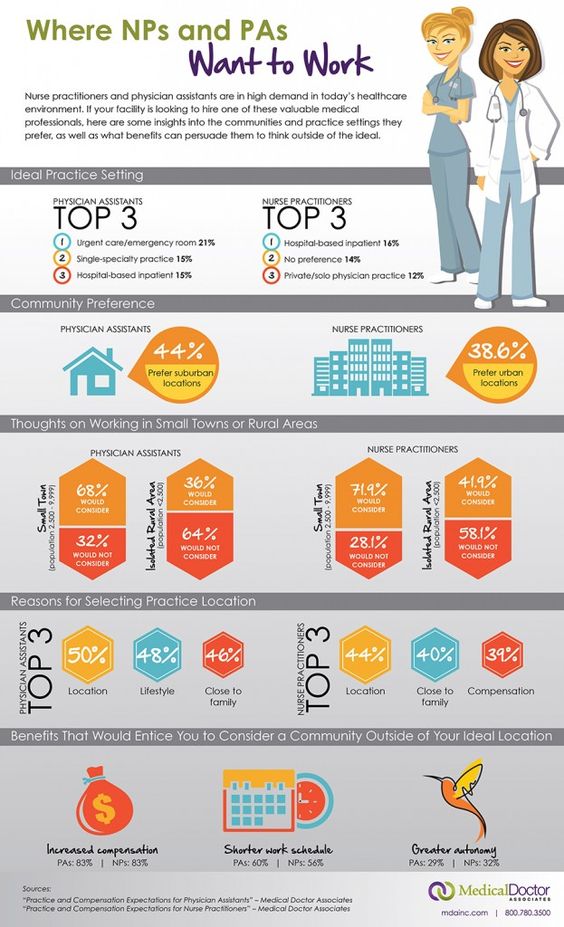The roles of a physician assistant and a nurse practitioner aren’t interchangeable. While their job functions may be similar — including prescribing medication and operating their own practices — each require distinct career paths with several years of certifications and licensing.

So you want to be a physician assistant…
Physician assistants, or PAs but never physician’s assistants, are licensed medical providers who can diagnose and treat illnesses. Students who wish to be physician assistants must graduate from an accredited PA program, pass the national certification exam and obtain a state license, in that order. In total, students in this health care field will have to study for six to seven years.
PAs must complete a recertification exam every 10 years and 100 hours of continuing medical education (CME) every two years in order to maintain their license. These hours and years are worth the job outlook considering about 75% of PAs receive multiple job offers after passing certification initial exams, giving new PAs a quick start in the profession. Back in 2010, the average age of a PA was about 27-years-old, compared to the average age of a nurse practitioner being 49-years-old.
Or perhaps a nurse practitioner?
Nurse practitioners, or NPs, are registered nurses with graduate degrees in nursing. Currently, there is a growing national movement to change the requirement from earning a Master of Science in Nursing to earning a Doctor of Nursing Practice. This is similar to the academic credentials earned by dentists (D.D.S.), physicians (M.D./D.O.), clinical psychologists (Psy.D. or Ph.D.) and clinical pharmacists (Pharm.D.). The total amount of years of education required is about six to eight years, though this may increase with the new requirement. This is likely the reason why the average age of an NP is significantly higher than that of a PA.
NPs provide care to patients of all ages, from premature newborns to the elderly. This health care profession can branch out into family care, women’s health, pediatrics and geriatric care. NPs can also specialize in occupational health, mental health and acute care. Currently, NPs choose primary care more than physician assistants; according to the American Association of Nurse Practitioners (AANP), more than 89% of NPs were prepared in primary care programs, compared to only 14.5% of physicians in 2017. Every year, Americans make over 870 million visits to NPs, whether it be to a hospital, clinic or private practice.
If you’re planning to enter the health care field, you need to be able to distinguish between the many professions it offers. Now that you know the difference between physician assistants and nurse practitioners, you’re one step closer to your dream health care career.


Comment:
Exactly how do you calculate educational requirements for NP and DNP? I have researched several different clinical/medical professions and NP requires, on average, 50 graduate hours. A DNP, on average, 80 graduate hours. Doctorate of Nurse Practitioner is actually about 30 graduate hours less than a Masters Physician Assistant degree which requires, on average 115 graduate hours, similar to Doctorate of Physical Therapy and Doctorate of Audiology. DNP is no where near the education of a DDS or MD, you appear to be trying to convince yourself or others your degree is something it’s not, without stating the facts. You should also use more recent data (2010 you sited above) to reflect the multitude of online NP and DNP direct entry programs with extreemly high acceptance rates of new, inexperienced RN’s.
Hi Susan, thank you for your feedback! The information in this post is pulled from our Nurse Practitioner profile, which was reviewed by the American Association of Colleges of Nursing in January 2017.
Exactly how do you calculate educational requirements for NP and DNP? I have researched several different clinical/medical professions and NP requires, on average, 50 graduate hours. A DNP, on average, 80 graduate hours. Doctorate of Nurse Practitioner is actually about 30 graduate hours less than a Masters Physician Assistant degree which requires, on average 115 graduate hours, similar to Doctorate of Physical Therapy and Doctorate of Audiology. DNP is no where near the education of a DDS or MD, you appear to be trying to convince yourself or others your degree is something it’s not, without stating the facts. You should also use more recent data (2010 you sited above) to reflect the multitude of online NP and DNP direct entry programs with extreemly high acceptance rates of new, inexperienced RN’s. It apalls me that you actually state NP is 6 to 8 years like DDS, MD, PharmD etc. NP is 6-8 years only because you take about 15 hours per year post BSN.
Hi Susan, thank you for your feedback! The information in this post is pulled from our Nurse Practitioner profile, which was reviewed by the American Association of Colleges of Nursing in January 2017.